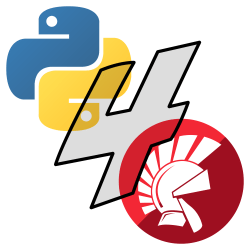Why would a Delphi developer want to add Python to their toolbelt? It is all about library access and scriptability. The open-source Python4Delphi (P4D) library by Kiriakos Vlahos, author of the popular PyScripter Python IDE, allows you as a Delphi developer to leverage the entire collection of Python libraries directly from Delphi. It also makes it easy to easily execute Python scripts, create new Python modules, and new Python types directly from your Delphi application. Give your Delphi applications the best of both worlds!
Join Python4Delphi author Kiriakos Vlahos, and Embarcadero Developer Advocate Jim McKeeth for this 2 part webinar to learn how to leverage Python in your Delphi applications.
Update: Because there was so much interest we are making this is a two-part webinar: Combining the Strengths of Delphi and Python.
- Using python libraries and objects in Delphi code
- Python based data analytics in Delphi applications
- Creating Python extension modules using Delphi
- Python GUI development using the VCL
What sort of Python libraries can you access from Delphi with Python4Delphi?
- TensorFlow – Machine Learning
- TensorFlow, developed by Google in collaboration with Brain Team, is used in almost every Google application for machine learning.
- Neural networks can be easily expressed as computational graphs using TensorFlow as a series of operations on Tensors.
- Numpy – Data Cleaning and Manipulation
- TensorFlow and other libraries use Numpy internally for performing multiple operations on Tensors. The array interface is the best and the most important feature of Numpy.
- Pandas – Data manipulation and analysis
- In particular, it offers data structures and operations for manipulating numerical tables and time series.
- The name is derived from the term “panel data”, an econometrics term for data sets that include observations over multiple time periods for the same individuals.
- Scikit-Learn – Machine learning and modeling
- It features various classification, regression and clustering algorithms including support vector machines, random forests, gradient boosting, k-means, and DBSCAN.
- Natural Language Toolkit (NLTK) – Text Processing
- A suite of libraries and programs for symbolic and statistical natural language processing (NLP) for English
- Intended to support research and teaching in NLP or closely related areas, including empirical linguistics, cognitive science, artificial intelligence, information retrieval, and machine learning
- SciPy – Data Science
- Used in science, mathematics, and engineering
- Contains modules for optimization, linear algebra, integration, interpolation, special functions, FFT, signal and image processing, ODE solvers, and other tasks common in science and engineering.
- Matplotlib & Seaborn for plotting, and statistical data visualization
- Pillow & MoviePy for image and video processing


